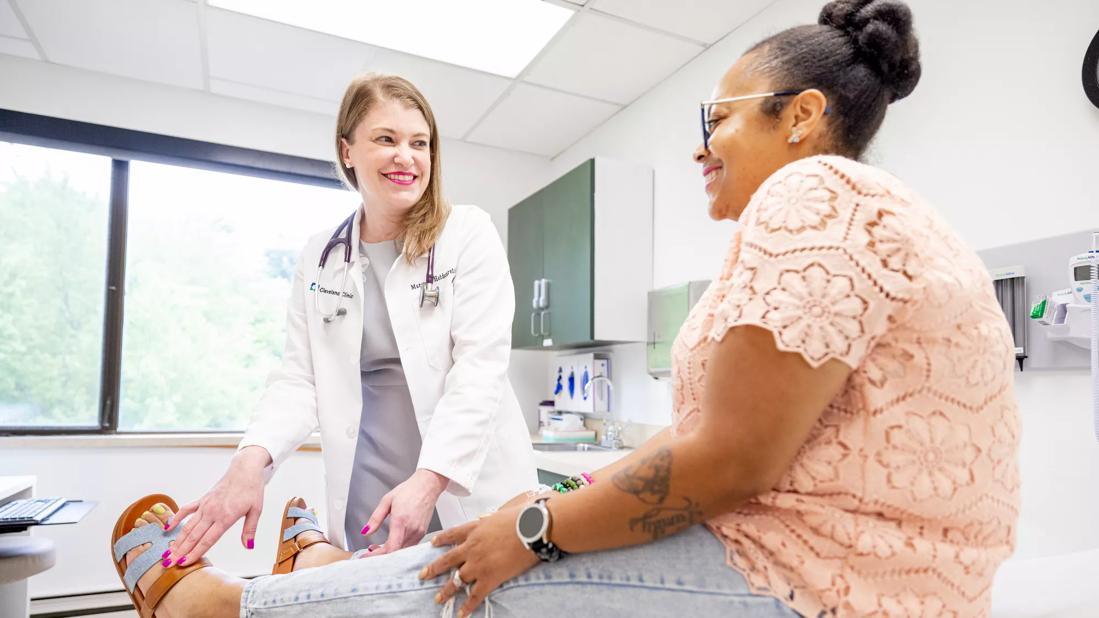Neurology nursing calls for skill, emotional intensity and more

Image content: This image is available to view online.
View image online (https://assets.clevelandclinic.org/transform/49464ad0-c50b-456f-b068-d836352e4730/NEU_4901959_06-19-24_014_LDJ)
Nurse with neuro patient
The U.S. Department of Health and Human Services’ National Institutes of Health acknowledges more than 600 known neurologic diseases. Caring for those with neurologic conditions requires a deep understanding of how these illnesses and injuries affect the body’s nervous system and more.
Advertisement
Cleveland Clinic is a non-profit academic medical center. Advertising on our site helps support our mission. We do not endorse non-Cleveland Clinic products or services. Policy
“Neurology nursing is a unique combination of clinical precision, high-stakes monitoring, emotional intensity and long-term patient engagement,” says Melanie Cook, BSN, RN, NE-BC, Assistant Director of Nursing, Neurological Institute, Orthopaedics and Rheumatology at Cleveland Clinic.
Cook oversees inpatient and outpatient neurological nursing at Cleveland Clinic’s Main Campus and Lou Ruvo Center for Brain Health in Las Vegas. Her team is comprised of more than 700 nursing caregivers, with hundreds more working throughout the health system’s operating rooms, procedure rooms, imaging suites and regional hospitals.
“Our dedicated nurses provide comprehensive care for patients with all kinds of neurological disorders, encompassing both medical and surgical needs,” she says.
Inpatient nurses care for people with conditions such as stroke, epilepsy, traumatic brain injury, seizures, multiple sclerosis, Parkinson's disease and brain tumors. Outpatient nurses provide 18 specialized services — ranging from sleep disorders to brain health — in clinics, infusion suites and procedure rooms.
Nurses at the Lou Ruvo Center focus on specific brain disorders — Alzheimer’s, Parkinson’s and Huntington’s disease, multiple system atrophy and multiple sclerosis — contributing to highly effective and innovative neuroscience research, treatment and educational support programming.
“The opportunities in neuro nursing are truly endless,” Cook shares.
The opening of a new Neurological Institute building on Main Campus in 2027 will create even greater possibilities for the organization’s neurology nurses. “This facility will be the largest and most technologically advanced neuro-focused center in the world,” she explains.
Advertisement
An important aspect of neurology nursing is understanding the complexities of the nervous system, which includes the brain, spinal cord and nerves, and the rest of the body. Nurses must effectively assess, monitor and manage neurological symptoms, requiring constant vigilance as patient conditions can fluctuate quickly.
“Neuro nurses are confident,” says Cook. “They possess strong assessment abilities and can adapt to ever-changing circumstances and patient care needs.”
The primary responsibility of Cleveland Clinic’s neurology nurses is to deliver expert neurological care to patients. “We care for some of the most critical and medically complex patients in the world,” Cook shares.
In addition to conducting assessments, monitoring neurological status and administering medications, a vital aspect of the nursing role is providing education and support to patients and their families. Because many neurological disorders can be life-altering, helping patients understand their condition and treatment options is important in empowering them to make informed decisions about their care. Frequent collaboration with neurologists, neurosurgeons and other healthcare professionals ensures patients receive comprehensive treatment tailored to their individual needs.
“Neuro nurses are team players,” says Cook. “And our team of leading clinicians has an unwavering dedication to patient care, research, education, training and clinical trials, enabling us to provide advanced neurological care.”
According to Cook, the best neurology nurses are proficient at blending scientific knowledge and clinical skill with compassionate care.
Advertisement
“The most successful nurses exhibit exceptional critical thinking, time management and communication skills — all while demonstrating kindness, compassion and patience,” Cook explains.
Delivering compassionate, empathetic care is crucial for this patient population. Many individuals with neurological disorders are challenged with physical disabilities, cognitive impairments and more. Nurses in this field are adept at recognizing the emotional and psychological effects that neurological conditions can have on patients and their families. They take the time to listen to patient concerns, address questions and offer reassurance.
“Neuro nurses form strong bonds with patients and their families and are fierce patient advocates,” describes Cook. “Every day, they offer hope and healing to those who might not have it otherwise.”
Becoming a neurology nurse requires post-secondary education and experience. Many are certified through the American Board of Neuroscience Nurses.
“I remember feeling quite intimidated by neuro during nursing school,” Cook admits. “The brain, spinal cord and nervous system are so complicated — not to mention, everything that is needed to care for patients with neurological diseases. Despite this, I accepted a position on a neuro unit as a new graduate, and 14 years later, my passion for this patient population has only grown.”
In addition to professional development, Cook suggests embracing coaching and mentoring for career enhancement.
“We are fortunate to have a group of highly experienced neuro nurse leaders who are passionate and dedicated to coaching and mentoring our caregivers,” she says. “Whether it's guiding someone who is considering a leadership position or supporting someone during their first presentation, we find great reward in helping others discover their passion and potential.”
Advertisement
She adds, “Neurology is an amazing nursing specialty where critical thinking, compassion and constant vigilance intersect every day. I can't imagine doing anything else.”
Advertisement
Advertisement
Regional organizations collaborate to address nurse faculty shortage
How wellness habits help nurses flourish
Planning continues with critical, patient-focused input from nursing teams
Strengthening care through targeted resources and frontline voices
Embracing generational differences to create strong nursing teams
CRNA careers offer challenge and reward
An unexpected health scare provides a potent reminder of what patients need most from their caregivers
Cleveland Clinic Abu Dhabi initiative reduces ICU admissions and strengthens caregiver collaboration